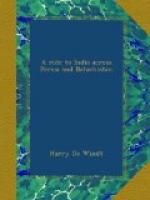With the exception of the aforesaid boulevard, the European quarter of Tiflis presents the same mixture of squalor and grandeur found in most Russian towns, St. Petersburg not excepted. There is the same dead, drab look about the streets and houses, the same absence of colour, the same indescribable smell of mud, leather, and drainage, familiar to all who have visited Asiatic Russia. I had intended remaining a couple of days, at most, in Tiflis, but my stay was now indefinitely prolonged. Such a severe winter had not been known for years. The mountain passes into Persia were reported impassable, and the line to Baku had for some days been blocked with snow.
My Russian Christmas (which falls, O.S., on our 6th of January) was not a cheerful one. A prisoner in a stuffy bedroom of the Hotel de Londres, I sat at the window most of the day, consuming innumerable glasses of tea and cigarettes, watching the steadily falling snow, and wondering whether the weather would ever clear and allow me to escape from a place so full of unpleasant associations, and which had brought me so much disappointment and vexation. The loud laughter and bursts of song that ascended every now and then from the crowded salle-a-manger (for the Hotel de Londres is the “Maison Doree” of Tiflis) only served to increase my depression and melancholy. Had there been a train available, I verily believe I should have taken a ticket then and there, and returned to England!
But morning brings consolation in the shape of blue sky and dazzling sunshine. The snow has ceased, apparently for good. Descending to breakfast full of plans for the future, I find awaiting me an individual destined to play an important part in these pages—one Gerome Realini, a Levantine Russian subject, well acquainted with the Persian language—who offers to accompany me to India as interpreter. His terms are moderate, and credentials first-rate. The latter include one from Baker Pasha, with whom he served on the Turkoman frontier expedition. More for the sake of a companion than anything else, I close with Gerome, who, though he does not understand one word of English, speaks French fluently.
There is a very natural prejudice against the Levantine race, but my new acquaintance formed an exception to the rule. I never had reason to regret my bargain; a better servant, pluckier traveller, or cheerier companion no man could wish for. Gerome had just returned from a visit to Bokhara, and his accounts of Central Asia were certainly not inviting. The Trans-Caspian railway was so badly laid that trains frequently ran off the line. There was no arrangement for water, travellers being frequently delayed three or four hours, while blocks of ice were melted for the boiler; while the so-called first-class carriages were filthy, and crowded with vermin. The advance of Holy Russia had apparently not improved Merv, which had become, since its annexation, a kind of inferior




